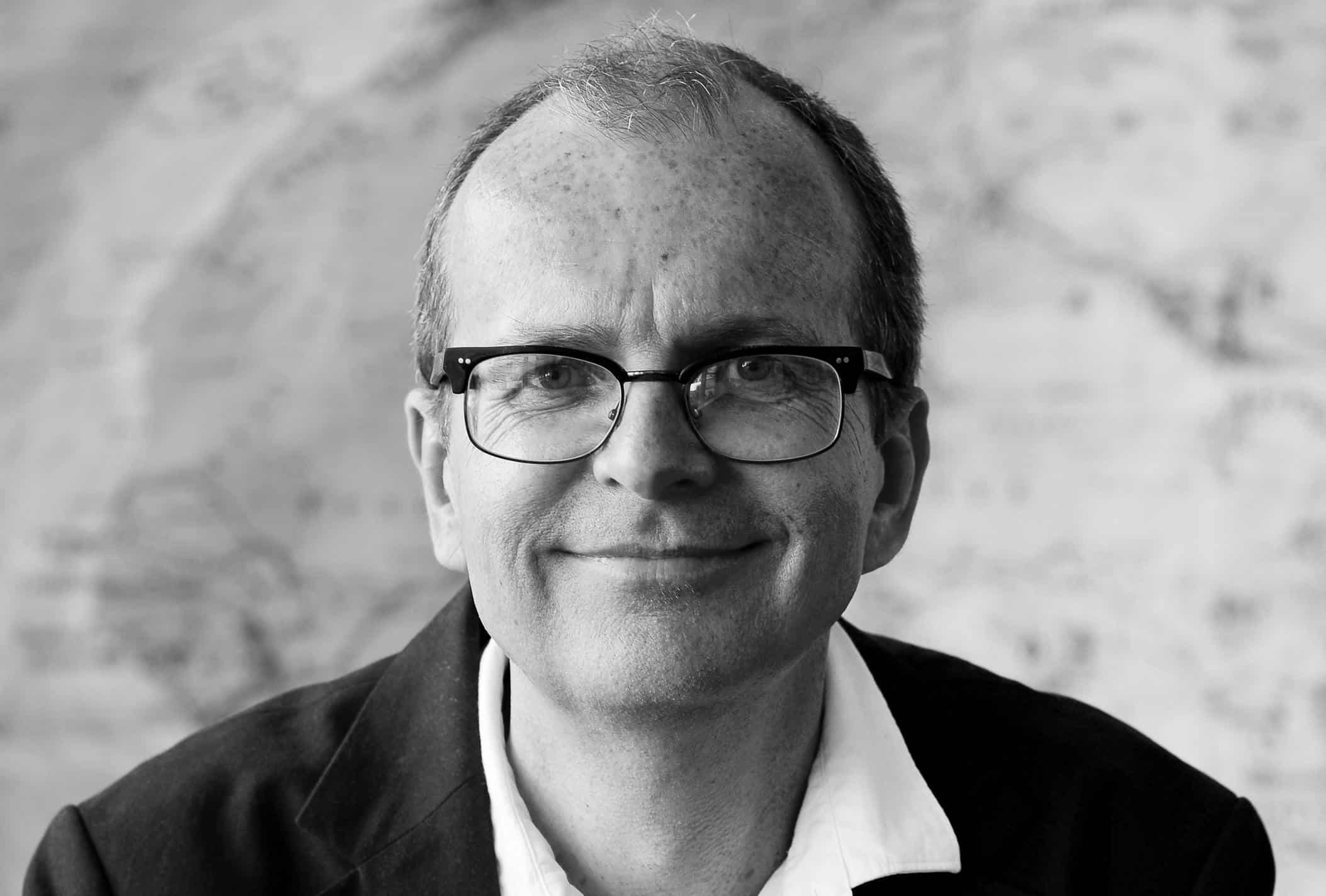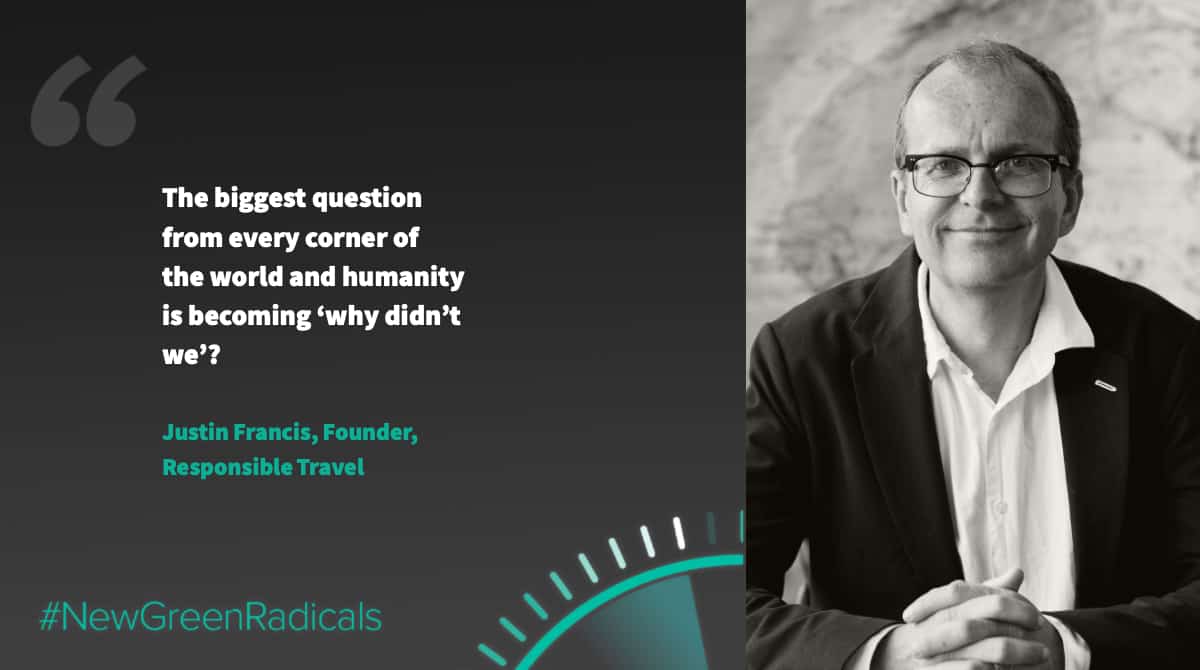New Green Radicals: Justin Francis

Justin Francis is founder and CEO of activist travel company Responsible Travel. It has strict policies on everything from turtle hatcheries to artificial snow, to ensure its holidays embody the best ethical and environmental standards.
The business, one of the first of its kind in the world, has been praised for “overturning conventional travel thinking”.
Do you think it’s important we respond to the climate emergency?
Yes. The biggest question from every corner of the world and humanity is becoming ‘why didn’t we’? Perhaps we should take that question down to a personal level. Deep down I know our business could do more to reduce CO2, and I suspect that most of us feel that way. Closing that gap is the first response that we all can make.
Why do you think we need green radicals at a time like this?
Green radicals – especially in the business community – offer something different. There is nothing business copies faster than another successful business. Green radical businesses create that choice, and also the threat of good example.
Green radicals turn rational arguments into tangible examples, and most of all, stories. Stories are how we learn and how all new ideas are shared. People find it easier to ignore reasoning than a great story.
How would you define a green radical?
I think there is some skill, and luck, in catching a wave and building a business fast and selling out after three years. This has become the definition of success in some start-up sectors. I think the far greater achievement is to build a business that is so relevant it survives 50-100 years.
Do we need to redefine markets and inspire others?
We often talk about redefining and disrupting. These are important concepts. When I was starting Responsible Travel I went to see my boss at the time, Anita Roddick, Founder of The Body Shop, who understood disruption very well. She asked me to codify the rules of the tourism industry; every industry has some unwritten rules that define how they operate. Having been asked to write them down on one half of the paper, Anita then drew a line down the middle of the page and asked me to break every rule, down the opposite side. That’s pretty much how I’ve approached every aspect of our business since.
Do you regard yourself as a green radical?
We’ve always sought to be that. From the start the purpose of the business is to make tourism a more caring and sustainable tourism industry. We are an activist business.
How has your organisation taken a radical approach to environmental action?
The most radical thing we’ve ever done was to call the business Responsible Travel. By definition it created the idea that not all travel companies are responsible, and that customers (and other travel companies) have a choice.
We were the first business in the world to use this term, and the first business 100% dedicated to responsible tourism.
How do you build the business case for radical change?
It’s pretty easy to research the social and environmental issues the world faces and come up with an idea. Sadly many green radical entrepreneurs stop there. Without a compelling and defendable customer proposition and realistic business plan it’s going nowhere.
What’s the biggest barrier to change?
We don’t have renewably powered aviation, and we won’t for 30 years. Rather than ask people to make simple changes, for example to switch energy supplier at home, we need to ask them fundamental questions about whether to take an overseas holiday or not. That’s a different level of change; and perhaps sacrifice. We ask our customers to think very carefully about their flights; to fly less and when they do fly, to make it count by choosing a holiday that can really make a difference.
However, voluntary changes by travellers are not enough. We need government level system change, which is why we launched our campaign for a Green Flying Duty.

What’s the secret to taking a radical idea into the mainstream?
The only secret to taking ideas mainstream is that they work – and in today’s capitalist economic system that means financially, as well as environmentally and socially.
Who are the green radicals that inspire you today?
Yvon Chouinard at Patagonia and Anita Roddick from The Body Shop. The Extinction Rebellion crew here at Responsible Travel. NGO partners we’ve worked with; often true green radicals.
What one radical thing would you like people to do right now to change our future?
I’d like to see us with a viable plan to reduce aviation emissions.
I’d also like to see us make a commitment for 50% of land to be used for nature and biodiversity. We can start in our own backyards.
This interview forms part of a series of interviews that were published in a new report, New Green Radicals: The business leaders responding to the climate emergency. The report follows last year’s ‘Meet the Disruptors’ and 2017’s ‘Secrets of the Pioneers’ reports, and this year features interviews with entrepreneurs, leaders and creators who are providing radical solutions to the climate crisis.
The report is produced by Greenhouse PR in association with BusinessGreen and was launched at the BusinessGreen Leaders’ Summit on October 23rd. Follow live on social media with #NewGreenRadicals.
At Greenhouse, we support a wide variety of organisations pioneering climate action. Whether it’s fashion, finance or farming, if you’ve got a great story and need our help to tell it, get in touch with the Greenhouse team on 0117 214 1250 or email info@greenhousepr.co.uk.


